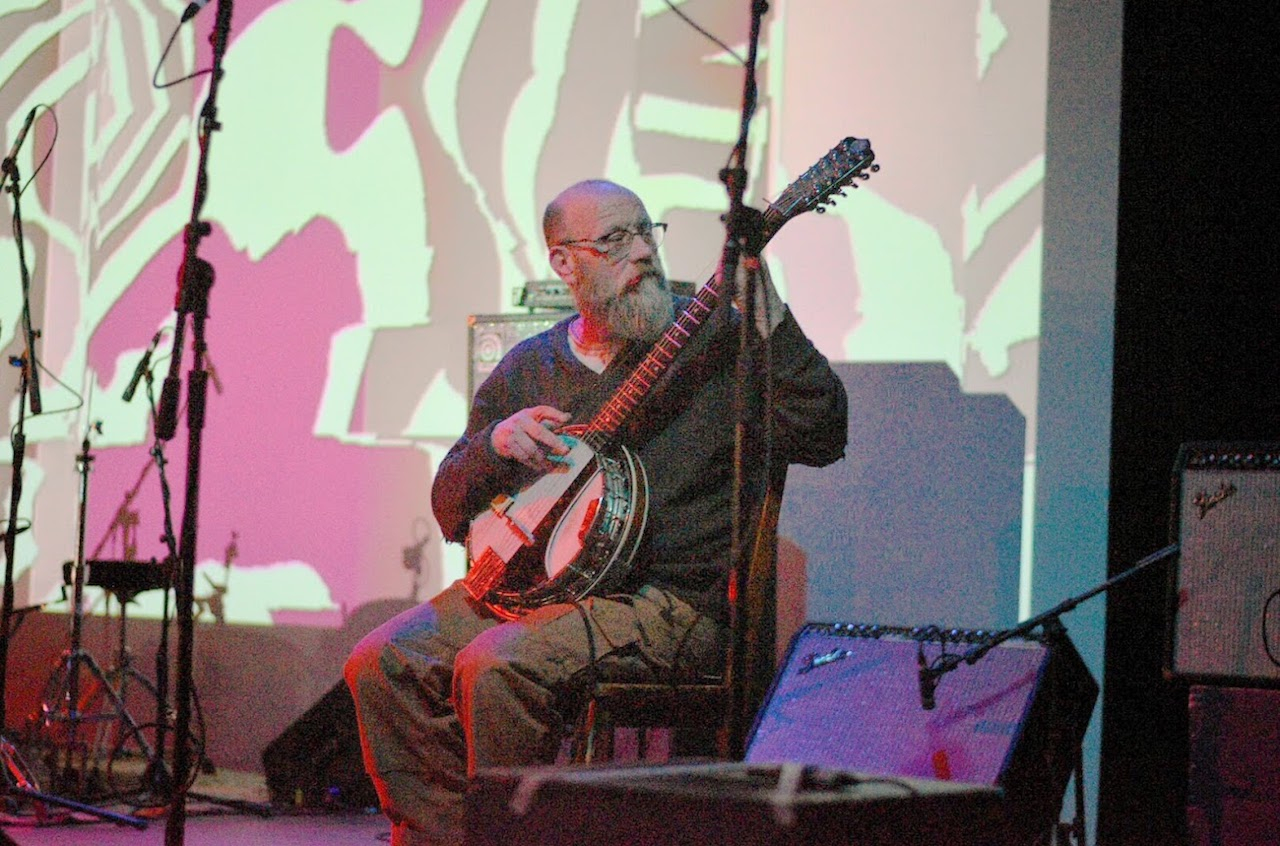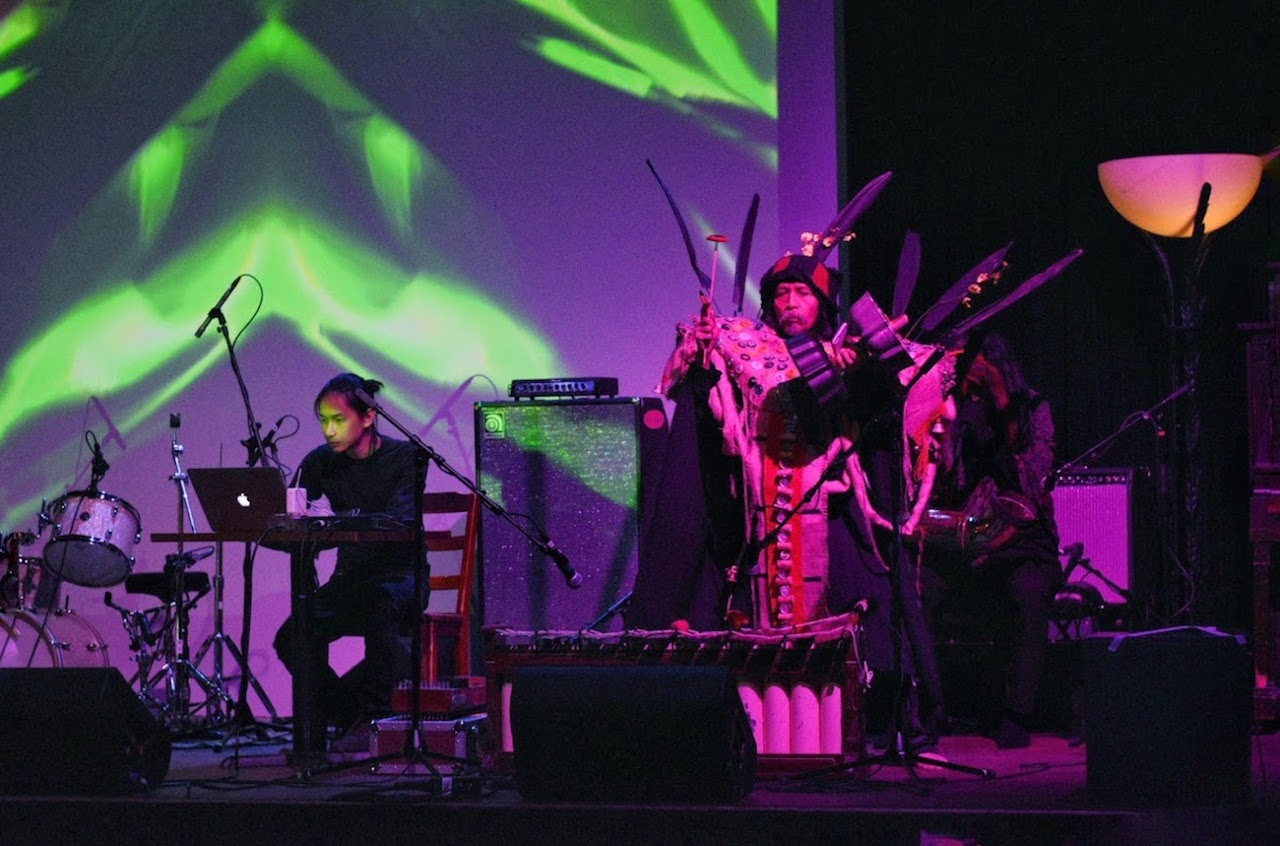- At a little after 3 AM on a wintry Saturday, I found myself inside a darkened cultural center in Minneapolis. I was lying down, ensconced in a sleeping bag, and on the stage in front of me a musician named Matt Rahaim was singing a raga while coaxing a warm, hypnotizing buzz from his tamboura. Around me were perhaps 60 or 70 people; some were seated and a few appeared to be meditating, but most were horizontal, camped out for the night. A little earlier, the band Low had been in the middle of a heavy, dirge-like jam, and I was now fading in and out of consciousness, in a room that had been inundated with all sorts of long, looping, reverberating sounds for about eight hours.
This was the fifth annual Drone Not Drones, an all-ages, 28-hour concert that celebrates the expansive world of drone music while raising funds for the humanitarian aid group Doctors Without Borders. The brainchild of a Minneapolis local, Luke Heiken, it took place at The Cedar Cultural Center in the West Bank, an ethnically diverse, arts-oriented neighborhood situated along the Mississippi River. With most of the floor open for sitting and laying down, and food and drink options available, attendees were encouraged to pack blankets and pillows and stick it out for a lengthy session. (Many ended up doing so—I stayed overnight and left only once, for a midday break.) The artists and bands, most playing 20 to 30-minute sets, alternated on opposite sides of a single stage, and merged the ends and beginnings of their sets to create a single nonstop drone. Delivered through an excellent soundsystem, the event was a triumph of collaboration and stage management that went off with hardly a hiccup, presenting some 60 acts—and just as many different musical languages—in a setting primed for immersion.
Drone Not Drones began on Friday at 7 PM with the sonorous gongs, delicate chimes and meandering strings of a group called International Novelty Gamelan. It concluded at 11 PM on Saturday, when Forma finished weaving a lush electro-acoustic tapestry. In between, a world of drone was created from all sorts of instruments. Memorable acts early on included Paul Metzger, with his meditations on a modified banjo, and Hastings 3000, a gas mask-wearing guitarist who crafted an appropriately dark and menacing soundscape. Before that was a cryptic trip with the music and performance group Belung Getih that featured two figures roaming the room: a lively shaman, whose wide-shouldered outfit was topped with long, black feathers, and a groaning, slow-moving mass of rope and string (or so it seemed) with bells attached to its wrists.
Mid-morning saw a wonderfully transcendental set by Friends, a flutist and a female vocalist duo from the local collective Six Families, whose ethereal mantras evoked some faraway jungle. Impressive later on was Ka Baird, from experimental outfit Spires That In The Sunset Rise, who performed a dynamic set using loops of ecstatic flute, trippy jaw harp and vocals that ranged from operatic singsong to frenetic sibilance. Sarah Davachi, the Canadian artist whose works have drawn increasing international acclaim, used a small assortment of electronics to let loose a captivating array of sustained tones, in which drifted harmonic nuances and spectral tensions.
Other notable sets near the end included those from Dahlheimer, who from behind a sign that read "Drone music is the closest I'll ever come to finding God," combined synths, cello, vocals and drums into masses of raw distortion, and Pyrrha, a string trio with constituent parts—viola, cello and bass—that pursued each other across melancholy 3/4 progressions. The Lesser Key Of Bannon, a mostly acoustic ensemble, paired a classical Indian drone with a slow-motion jazz freakout, and Loscil, playing the second-to-last set before Forma, placed sparse, atmospheric synths atop the barest hint of a downtempo beat.
At around 11 PM, as Forma brought Drone Not Drones to its conclusion, a round of applause rose from the audience. As everyone began rising from their seats and nests, one of the organisers took the stage to deliver thanks and salutations. "Goodnight moon, goodnight drone," he said—a fitting sign-off for a truly one-of-a-kind experience.
Photo credit /
Jessica Heiken
 Mid-morning saw a wonderfully transcendental set by Friends, a flutist and a female vocalist duo from the local collective Six Families, whose ethereal mantras evoked some faraway jungle. Impressive later on was Ka Baird, from experimental outfit Spires That In The Sunset Rise, who performed a dynamic set using loops of ecstatic flute, trippy jaw harp and vocals that ranged from operatic singsong to frenetic sibilance. Sarah Davachi, the Canadian artist whose works have drawn increasing international acclaim, used a small assortment of electronics to let loose a captivating array of sustained tones, in which drifted harmonic nuances and spectral tensions. Other notable sets near the end included those from Dahlheimer, who from behind a sign that read "Drone music is the closest I'll ever come to finding God," combined synths, cello, vocals and drums into masses of raw distortion, and Pyrrha, a string trio with constituent parts—viola, cello and bass—that pursued each other across melancholy 3/4 progressions. The Lesser Key Of Bannon, a mostly acoustic ensemble, paired a classical Indian drone with a slow-motion jazz freakout, and Loscil, playing the second-to-last set before Forma, placed sparse, atmospheric synths atop the barest hint of a downtempo beat. At around 11 PM, as Forma brought Drone Not Drones to its conclusion, a round of applause rose from the audience. As everyone began rising from their seats and nests, one of the organisers took the stage to deliver thanks and salutations. "Goodnight moon, goodnight drone," he said—a fitting sign-off for a truly one-of-a-kind experience. Photo credit / Jessica Heiken
Mid-morning saw a wonderfully transcendental set by Friends, a flutist and a female vocalist duo from the local collective Six Families, whose ethereal mantras evoked some faraway jungle. Impressive later on was Ka Baird, from experimental outfit Spires That In The Sunset Rise, who performed a dynamic set using loops of ecstatic flute, trippy jaw harp and vocals that ranged from operatic singsong to frenetic sibilance. Sarah Davachi, the Canadian artist whose works have drawn increasing international acclaim, used a small assortment of electronics to let loose a captivating array of sustained tones, in which drifted harmonic nuances and spectral tensions. Other notable sets near the end included those from Dahlheimer, who from behind a sign that read "Drone music is the closest I'll ever come to finding God," combined synths, cello, vocals and drums into masses of raw distortion, and Pyrrha, a string trio with constituent parts—viola, cello and bass—that pursued each other across melancholy 3/4 progressions. The Lesser Key Of Bannon, a mostly acoustic ensemble, paired a classical Indian drone with a slow-motion jazz freakout, and Loscil, playing the second-to-last set before Forma, placed sparse, atmospheric synths atop the barest hint of a downtempo beat. At around 11 PM, as Forma brought Drone Not Drones to its conclusion, a round of applause rose from the audience. As everyone began rising from their seats and nests, one of the organisers took the stage to deliver thanks and salutations. "Goodnight moon, goodnight drone," he said—a fitting sign-off for a truly one-of-a-kind experience. Photo credit / Jessica Heiken